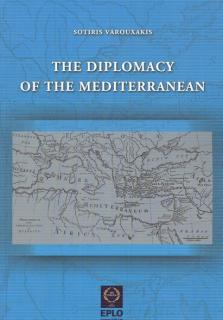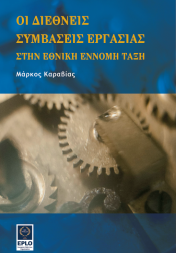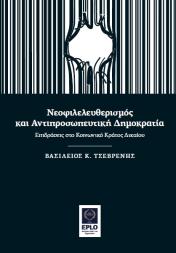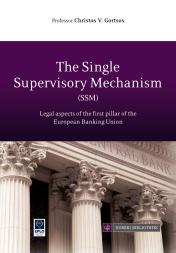
S. Varouxakis, "The Diplomacy of the Mediterranean", 2013, 442 pp., ISBN: 978-960-87611-0-0
The relations between the European states and the countries around the Mediterranean have been difficult throughout history, but nevertheless of crucial importance for both sides. Trade rela¬tions, multiple exchanges, cultural influences, but also conflicts, wars and alliances, were the main characteristics of the historical process.
Against this background, during the last two decades, politicians and diplomats from both sides understood that a new modus vivendi in their relations was necessary, in order to reach solutions on many problems. In fact, everybody felt that a common effort was needed, aiming at the creation of a framework for discussion and coopera¬tion between countries and peoples who had, at the same time, many common interests, but also many differences and rivalries.
This book tries to present, describe and analyze these efforts and the 'behind the scenes' actions whose goal it was to create an insti¬tutional framework - capable of guaranteeing peace, stability, secu¬rity and prosperity for all the peoples of the Mediterranean.
The author, Ambassador Sotiris Varouxakis, has personally participated in the greater part of this journey, representing Greece in the Senior Officials Meetings. He has been elected, in 2011, as Deputy Secretary General in the Secretariat of the Union for the Mediterranean.
SUMMARY
THE DIPLOMACY OF THE MEDITERRANEAN
PROLOGUE for the English edition
INTRODUCTION
CHAPTER ONE
I. HISTORICAL INTRODUCTION
1. Ancient Times
2. Modern Times
3. Arab-Israeli Conflict (The Middle East Question)
4. Contemporary Period
5. The Mediterranean Policy of the European Union
6. The Framework of Political Architecture in the Mediterranean
II. REGIONAL COOPERATION
7. The Five-plus-Five Initiative (5+5)
8. The Parliamentary Assembly of the Mediterranean
9. Euro-Arab Dialogue - Malta's Initiative
10. Regional and Sectoral Schemes
11. Olive Group
III. 12. THE MEDITERRANEAN POLICY OF GREECE
CHAPTER TWO
THE MEDITERRANEAN FORUM
13. Establishment
14. Institutional Framework
15. Enlargement
16. Functioning - Evolution
17. Code of Conduct on Terrorism
18. General Principles
19. The Greek Presidencies (2002, 2007)
PART ONE
THE BARCELONA PROCESS
THE EURO-MEDITERRANEAN PARTNERSHIP (COOPERATION)
CHAPTER ONE
ESTABLISHMENT OF THE BARCELONA PROCESS
20. From Madrid to Barcelona (1991-1995)
21. The Euro-Mediterranean Conference in Barcelona
(27-28/11/1995)
22. Barcelona Declaration
23. First Chapter - Political
24. Second Chapter - Economic
25. Third Chapter - Socio-cultural
CHAPTER TWO
INSTITUTIONAL FRAMEWORK
I. ORGANS
26. a. Meetings of Ministers for Foreign Affairs
27. b. Sectoral Ministerial Meetings
28. c. Senior Officials Meetings (SOM)
29. d. Euro-Mediterranean Committee
30. e. European Commission and its Role
31. f. Working Groups
32. g. Presidency
II. AUTONOMOUS ORGANS
33. a. Anna Lindh Foundation for Dialogue between Cultures
34. b. Euro-Mediterranean Parliamentary Assembly
35. c. Civil Forum
III. MEANS OF ACTION
36. a. Declarations - Presidency Conclusions - Decisions
37. b. MEDA
38. c. European Neighborhood Policy
39. d. European Neighborhood and Partnership Instrument
(ENPI)
40. e. FEMIP (Facility for Euro-Mediterranean Investment and Partnership)
IV. 41. GENERAL PRINCIPLES
CHAPTER THREE
FUNCTIONING
42. Political Dialogue
43. Economic Cooperation
44. The Socio-cultural Dimension
45. Dialogue between Cultures
46. Alliance of Civilizations
47. The Greek Presidency (2003)
CHAPTER FOUR
EVOLUTION
48. Valencia Action Plan
49. Greater Middle East
50. Forum for the Future - Fund for the Future
51. EU Strategic Partnership with the Mediterranean and Middle East
52. The 10th Anniversary of the Euro-Mediterranean Summit (Barcelona + 2005)
53. Conclusions of the Barcelona Summit (2005) /Migration
54. Code of Conduct on Terrorism
55. Five-Year Work Program
56. CFSP, CSDP and the Barcelona Process
57. The Political Crises
58. a. The Arab-Israeli Conflict
59. b. The Terrorist Attacks of September 11th 2001
60. c. The Iraq War
61. d. The Prophet Muhammad Cartoons
62. e. The Lebanon War
CHAPTER FIVE
THEORETICAL APPROACH AND CRITICISM
63. Legal Nature
64. Political Parameters
65. Appraisal and Criticism - Efforts for Reinvigoration
PART TWO
UNION FOR THE MEDITERRANEAN
CHAPTER ONE
THE VISION AND THE PROPOSAL FOR A "MEDITERRANEAN UNION"
Ι. 66-68. THE VISION OF THE "UNION"
ΙΙ. 69-71. POLITICAL AND DIPLOMATIC BACKGROUND
72. Objectives of the French Diplomacy
III. THE INITIAL "PACKAGE OF IDEAS" AND REACTIONS
73. "Package of Ideas" -
Presentation at the Multilateral Forum
74-80. Reactions to the French Proposal
IV. THE GREEK POSITION
CHAPTER TWO
SHAPING OF THE PROJECT "UNION FOR THE MEDITERRANEAN"
84. Appel de Rome (20/12/2007)
85-89. Franco-German Compromise
90. Conclusions of the European Council
91. Revised French Proposal (6/4/2008)
92. Communication of the European Commission (20/5/2008)
93. Positive French Reaction (20/5/2008)
94. Resolution of the European Parliament (5/6/2008)
CHAPTER THREE
ESTABLISHMENT OF THE UNION FOR THE MEDITERRANEAN
I. CONSTITUTIONAL SUMMIT CONFERENCE OF PARIS (13/7/2008)
95-98. Preparatory Senior Officials Meetings for the Summit Conference
99-101. Paris Summit Conference for the Mediterranean (13/7/2008)
102. Joint Declaration of the Paris Summit Conference on the Mediterranean
II. INSTITUTIONAL MEETING OF MINISTERS FOR FOREIGN AFFAIRS IN MARSEILLE
103. Towards the Ministerial Meeting - The First Crisis
104. Ministerial Meeting in Marseille (3-4/11/2008)
105-107. Marseille Declaration
CHAPTER FOUR
INSTITUTIONAL FRAMEWORK
I. 108. ORGANS OF THE UFM
109. a. Summit Meetings
110. b. Presidency - Co-Presidency - Presidency of the EU
111. c. Meetings of Ministers for Foreign Affairs
112. d. Sectoral Ministerial Meetings
113. e. Senior Officials Meetings
114. f. Joint Permanent Committee
115. g. Working Groups
116. h. The Role of the European Commission
II. AUTONOMOUS ORGANS
117. a. Secretariat
118. b. Parliamentary Assembly of UfM
119. c. Anna Lindh Foundation
for Dialogue between Cultures
120. d. Civil Forum
121. e. Local Administration
III. 122. MEANS OF ACTION (Declarations, Conclusions of the Presidency, Decisions)
IV. 123. GENERAL PRINCIPLES
CHAPTER FIVE
THE DIFFICULT BEGINNING
124. The Gaza Crisis
125. The Statute of the Secretariat
126. The Beginning of Functioning
127. Postponement of the Second Summit Meeting
127 bis. First Operational Steps
CHAPTER SIX
THEORETICAL APPROACH AND REALITY
I. 128. LEGAL NATURE
II. 129. POLITICAL PARAMETERS
III. 130-132. THE PERSONALITIES, THE POLICIES, THE SYMBOLISMS
IV.133-135. CRITICAL ASSESSMENT
EPILOGUE
THE FUTURE OF EURO-MEDITERRANEAN RELATIONS
136-137. Reflections and Prospects
ANNEX
I. Mediterranean Forum - Code of Conduct
II. Mediterranean Forum - General Principles
III. Arab League Summit, Beirut, 27-28 March 2002 - Arab Peace Initiative Presented by Prince Abdullah Bin Abdul-Aziz
IV. Barcelona Declaration
V. 5th Euro-Mediterranean Conference of Ministers for Foreign Affairs - Valencia Action Plan
VI. Mid-term Euro-Mediterranean Conference - Crete, 26-27 May 2003, Presidency Conclusions
VII. 10th Anniversary Euro-Mediterranean Summit - Chairman's Statement, Barcelona, 27-28 November 2005
VIII. Council of the European Union - 10th Anniversary Euro-Mediterranean Summit, Barcelona, 27-28 November 2005 - Euro-Mediterranean Code of Conduct on Countering Terrorism
IX. Council of the European Union - 10th Anniversary Euro-Mediterranean Summit, Barcelona, 27-28 November 2005 - Five Year Work Programme
X. Council of the European Union, Brussels, 13-14 March 2008 - Annex I, Statement on "Barcelona Process: Union for the Mediterranean"
XI. Commission of the European Communities - Communication from the Commission to the European Parliament and the Council - Barcelona Process: Union for the Mediterranean
XII. The Barcelona Process: Union for the Mediterranean - European Parliament Resolution of 5 June 2008 on the Barcelona Process: Union for the Mediterranean
XIII. Joint Declaration of the Paris Summit for the Mediterranean, Paris, 13 July 2008
XIV. Barcelona Process: Union for the Mediterranean - Ministerial Conference - Final Statement, Marseille, 3-4 November 2008
XV. Statutes of the Secretariat of the Union for the Mediterranean





















